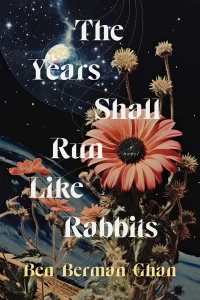By Samantha Purchase
The Years Shall Run Like Rabbits
by Ben Berman Ghan
Wolsak & Wynn (2024)
‘Imagine’ opens Ben Berman Ghan’s expansive and timely novel, The Years Shall Run Like Rabbits, and imagine he does. Space whales that are also ships, AI, Toronto, algorithms, colonialism, ghosts, consumerism, consciousness, unconsciousness, the last dying flickers of capitalism–Ghan imagines (or maybe extrapolates) the natural conclusion to these tantalizing threads, with language that sits somewhere between cinematic and poetic but is always precise.
The breadth of the novel, the sheer scope of it–spanning across galaxies, eons, ages–brings to mind the work of Ursula Le Guin or Octavia Butler with a hint of the (I would argue, often entirely correct) speculation of Philip K. Dick or George Orwell. Ghan’s style is reminiscent of that well-practiced sleight of hand these authors so frequently utilize to showcase a world so different from ours, so mythic, so alien, that it is only upon finishing it that you realize it could only be a reflection of our own current, fraught, and fractured times.
What works best about any kind of science fiction is the impulse to imagine–and in Ghan’s case, redefine, extrapolate, rearrange–a world in which people (and animals, and plants, and technology, and machines) must live with the consequences to our current actions. I often find the endless volatility and uncertainty of our times intensely overwhelming, and when reading fiction, it is difficult not to feel a bone-deep ache for what we will not be able to fix. How could we fix it when there is seemingly no end to the horrors of our world, from any number of genocides, surveillance capitalism, police brutality, or state violence? But under Ghan’s direction, The Years Shall Run Like Rabbits offers a speculative view of humanity (and beyond) that highlights the endurance of spirit, decency, and of love, spanning across the cosmos itself.
A lot of the themes extrapolated in The Years Shall Run Like Rabbits reminded me of Daniel Heath Justice’s Why Indigenous Literatures Matter, particularly Justice’s notion of becoming a good relative to our non-human kin–for why would the creation of AI, arguably the first things humans have created that we have no true way of understanding, not be needing our care or consideration? So much of The Years Shall Run Like Rabbits incorporates kinship: the kinship between humans, the environment, our technology(ies), our machines, our sense of time. Ghan illustrates what might or could occur when we move beyond conceiving of love as a sentimental emotion but rather, as Justice wrote, a shared experience that moves us “beyond differences” (111). I think in particular of how Ghan writes of the hologram in the prologue; “her thoughts had slipped into the great machine I’d come from. A ghost and not a machine. What was the difference between us?”(14). When a technology becomes sentient, becomes conscious, does that make it closer to a human being than a technology? Should that matter? Ghan raises and answers (some) of these questions throughout the novel, often causing me to pause the reading experience to parse through its many narrative threads.
The Years Shall Run Like Rabbits bends beyond the conventions of the novel, incorporating elements of poetry and fragmentary vignettes that illustrate the expansiveness of Ghan’s universe. The dreary and eerily constructed near-future Toronto that bleeds into the more incredible expanse–a colonized moon, for instance–showcases Ghan’s gift for worldbuilding that still feels incredibly present. The characters are vibrant and deeply felt, the world rich, immersive, and desperately, desperately close. I often wished I was back in Toronto when I was reading, just to be able to walk down the streets reimagined and reordered in Ghan’s work.
Dystopian, speculative, timely, and timeless, Ghan’s work illuminates a world I feel we are already halfway to. But where Ghan could wallow in misery or doom, he deftly injects compassion, a grace, that flows throughout the novel and offers something beyond a warning–a way forward. If you are looking for something singular, a blend of cyberpunk and post-humanism, a story told in lurches and stops, look no further. I’ve never read anything like it.

